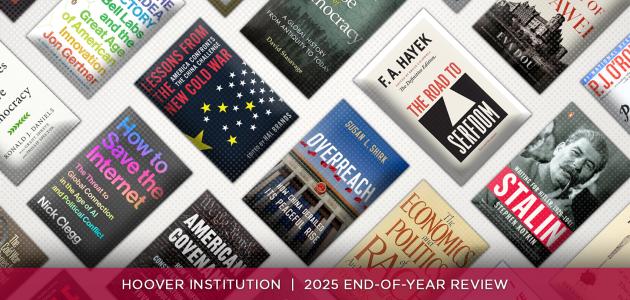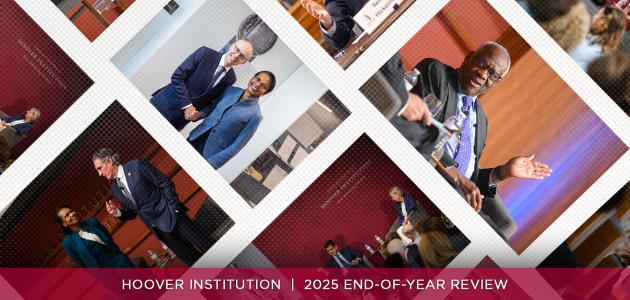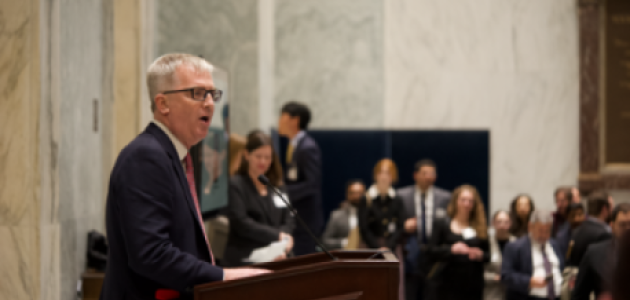Hoover Institution (Stanford, CA) – In a new essay published by the Hoover Institution, Leonard and Shirley Ely Senior Fellow John F. Cogan and Shepard Family Distinguished Visiting Fellow in Economics Kevin Warsh outline a new economic governance framework, grounded in the founding principles that have driven American prosperity for over two centuries.
In “Reinvigorating Economic Governance,” Cogan and Warsh explain that in the past two decades four great shocks have left an indelible mark on Americans, not least in terms of lives lost and opportunities missed but also in their reshaping of the nation’s political, social, and economic character. These include the attacks of September 11, 2001, the global financial crisis of 2007–8, the “great lockdown” that resulted from the COVID-19 pandemic in 2020, and Russia’s invasion of Ukraine in 2022.
The scholars explain that each of these cases exacerbated existing trends that are undermining freedom, diminishing the role of the individual at the core of society, and distorting the authority of political institutions.
“Today, individuals and businesses find themselves subject to more intrusive government edicts, national debt that exceeds national income, less security, less liberty, and less assured prosperity,” Cogan and Warsh write.
Cogan and Warsh go on to describe the long-standing institutional arrangements, embedded in the American system of natural liberty, that provide the necessary incentives for the human condition to flourish: private property rights, the rule of law, free and competitive markets, and limited government. They stress that nations that abide by these foundational principles tend to achieve strong, sustained economic progress. Conversely, countries that have failed to adopt these principles have experienced negative economic outcomes.
Reinvigorating economic governance from these bedrock principles, Cogan and Warsh argue, requires a renewed focus on liberating the individual, encouraging the promulgation of new ideas, and ensuring the proper functioning of strong, faithful institutions. In the essay, the two economists list ten truths for each of these three key tenets of governance.
“Ideas, individuals, and institutions can either reinforce or undermine one another,” Cogan and Warsh write. “That is, the best economic ideas are consistent with the inherent motivations of the citizenry. And our institutions, private and public, should facilitate putting ideas into practice to optimal effect. Poorly functioning institutions—ones that are corrupt or unaccountable or overly burdensome—will undermine the incentives of individuals and reduce future prosperity.”
The authors argue that deviation from sound governance principles has undermined America’s founding ethos. The country has experienced a deteriorating fiscal outlook and a redistribution of power to the administrative state that is making elected leaders less responsive and political institutions more vulnerable to improper influence. The dismissal of ideas based on collective ideology has made society less healthy and prosperous. And the overemphasis of group needs and rights has eroded individual freedoms that were once deemed unassailable.
This has meant weaker economic output and outcomes, and complacency among citizens who expect too much from the government and too little of themselves. Democratic virtues such as humility, restraint, and tradition have become unfashionable, and civil society is losing its shared sense of community.
Expansive US government power often coincides with greater incumbency advantages for a country's largest corporations. Conflating roles of public and private institutions raises barriers to competition, hampers the creation of new ideas, and undermines prosperity.
Warsh and Cogan advocate applying their governance framework to existing economic policies. They argue, for example, that current fiscal policies should be rigorously reviewed, as government spending, which increased during the peak of the COVID-19 pandemic, is projected to remain a disproportionately larger share of economic output even after the pandemic. They maintain that the spending surge, unless abated, will lead to deleterious effects on America, including the destruction of fiscally prudent ideas; the degradation of political institutions, which are charged with being responsible stewards of the national debt; and reduced work incentives and increased dependency for Americans, many of whom already rely on costly federal entitlement programs. They hold that their framework should be applied with equal rigor to other economic policies, including those governing central banking, regulation, health care, antitrust laws, and trade.
“The economic governance principles that drove American peace and prosperity should serve as guideposts to navigate the balance of the twenty-first century,” Cogan and Warsh conclude. “If we choose to empower the individual, encourage the development and dissemination of new ideas, and ensure the fidelity of institutions to their mission, then the United States can once again be a beacon to the world.”
Click here to read the whole essay.
John F. Cogan is the Leonard and Shirley Ely Senior Fellow at the Hoover Institution and a faculty member in the Public Policy Program at Stanford University. Cogan’s research is focused on US budget and fiscal policy, federal entitlement programs, and health care. His book The High Cost of Good Intentions (2017) received the 2018 Hayek Prize.
Kevin Warsh is the Shepard Family Distinguished Visiting Fellow in Economics at the Hoover Institution and a lecturer at the Stanford Graduate School of Business. He is an advisor to Duquesne Family Office. Warsh has served as a member of the Federal Reserve’s Board of Governors and special assistant to the president for economic policy.
For coverage opportunities, contact Jeffrey Marschner, 202-760-3187, jmarsch@stanford.edu.






















